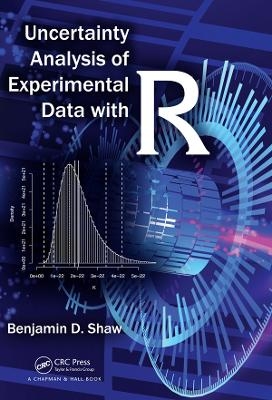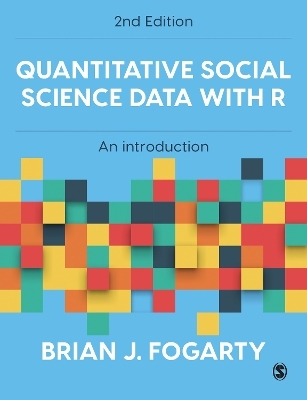
Uncertainty Analysis of Experimental Data with R
Chapman & Hall/CRC (Verlag)
978-1-4987-9732-0 (ISBN)
"This would be an excellent book for undergraduate, graduate and beyond….The style of writing is easy to read and the author does a good job of adding humor in places. The integration of basic programming in R with the data that is collected for any experiment provides a powerful platform for analysis of data…. having the understanding of data analysis that this book offers will really help researchers examine their data and consider its value from multiple perspectives – and this applies to people who have small AND large data sets alike! This book also helps people use a free and basic software system for processing and plotting simple to complex functions." Michelle Pantoya, Texas Tech University
Measurements of quantities that vary in a continuous fashion, e.g., the pressure of a gas, cannot be measured exactly and there will always be some uncertainty with these measured values, so it is vital for researchers to be able to quantify this data. Uncertainty Analysis of Experimental Data with R covers methods for evaluation of uncertainties in experimental data, as well as predictions made using these data, with implementation in R.
The books discusses both basic and more complex methods including linear regression, nonlinear regression, and kernel smoothing curve fits, as well as Taylor Series, Monte Carlo and Bayesian approaches.
Features:
1. Extensive use of modern open source software (R).
2. Many code examples are provided.
3. The uncertainty analyses conform to accepted professional standards (ASME).
4. The book is self-contained and includes all necessary material including chapters on statistics and programming in R.
Benjamin D. Shaw is a professor in the Mechanical and Aerospace Engineering Department at the University of California, Davis. His research interests are primarily in experimental and theoretical aspects of combustion. Along with other courses, he has taught undergraduate and graduate courses on engineering experimentation and uncertainty analysis. He has published widely in archival journals and became an ASME Fellow in 2003.
Benjamin D. Shaw is a professor in the Mechanical and Aerospace Engineering Department at the University of California, Davis. His research interests are primarily in experimental and theoretical aspects of combustion. Along with other courses, he has taught undergraduate and graduate courses on engineering experimentation and uncertainty analysis. He has published widely in archival journals and became an ASME Fellow in 2003.
CHAPTER 1 INTRODUCTION
What Is This Book About? Units, Physical Constants and Their Uncertainties, Dimensionless Quantities, Software
CHAPTER 2 ASPECTS OF R *
Getting R, Using R, Getting Help, Libraries and Packages, Variables, Vectors, Arithmetic, Data Frames, Exporting Data, Importing Data, Internal Mathematical Functions, Writing Your Own Functions, Plotting Mathematical Functions, Loops, Making Decisions, Scripts, Reading Data from Websites, Matrices and Linear Algebra, Some Useful Functions and Operations
CHAPTER 3 STATISTICS *
Populations and Samples, Mean, Median, Standard Deviation, and Variance of a Sample, Covariance and Correlation, Visualizing Data Histograms, Box Plots, Plotting Data Sets, Some Plotting Parameters and Commands Estimating Population Statistics Confidence Interval for the Population Mean Using Student's t Variables, Confidence Interval for the Population Variance Using Chi-Square Variables, Confidence Interval Interpretation Comparing the Means of Two Samples, Testing Data for Normality, Outlier Identification, Modified Thompson Technique, Chauvenet's Criterion *
CHAPTER 4 CURVE FITS *
Linear Regression, Nonlinear Regression, Kernel Smoothing
CHAPTER 5 UNCERTAINTY OF A MEASURED QUANTITY *
What Is Uncertainty? Random Variables, Measurement Uncertainties, Elemental Systematic Errors, Normal Distributions, Uniform Distributions, Triangular Distributions
CHAPTER 6 UNCERTAINTY OF A RESULT CALCULATED USING EXPERIMENTAL DATA *
Taylor Series Approach. Coverage Factors, The Kline-McClintock Equation, Balance Checks
CHAPTER 7 TAYLOR SERIES UNCERTAINTY OF A LINEAR REGRESSION CURVE FIT
Curve-fit Expressions, Cases to Consider: Case 1: No Errors and No Correlations, Case 2: Random Errors Only, Case 3: Random and Systematic Errors *
General Linear Regression Theory, Uncertainties in Regression Coefficients, Evaluating Uncertainties with Built-in R functions *
CHAPTER 8 MONTE CARLO METHODS *
Overall Monte Carlo Approach, Random Number Generation, Accept/Reject Method, Inverse-cdf Method *Random Sampling, Uncertainty of a Measured Variable, Bootstrapping with Internal Functions in R, Monte Carlo Convergence Criteria, Uncertainty of a Result Calculated Using Experimental Data, Uncertainty Bands for Linear Regression Curve Fits, Uncertainty Bands for a Curve Fit with Kernel Smoothing *
CHAPTER 9 THE BAYESIAN APPROACH *
Bayes Theorem for Probability Density Functions; Bayesian Estimation of the Mean and Standard Deviation of a Normal Population *
APPENDIX PROBABILITY DENSITY FUNCTIONS *
Univariate pdfs Normal Distribution, Uniform Distribution, Triangular Distribution, Student's t Distribution, Chi-Square Distribution Multivariate pdfs, Marginal Distributions, References
| Erscheinungsdatum | 22.06.2017 |
|---|---|
| Zusatzinfo | 50 Illustrations, black and white |
| Sprache | englisch |
| Maße | 156 x 234 mm |
| Gewicht | 430 g |
| Themenwelt | Mathematik / Informatik ► Mathematik ► Computerprogramme / Computeralgebra |
| Technik ► Maschinenbau | |
| ISBN-10 | 1-4987-9732-6 / 1498797326 |
| ISBN-13 | 978-1-4987-9732-0 / 9781498797320 |
| Zustand | Neuware |
| Haben Sie eine Frage zum Produkt? |
aus dem Bereich


